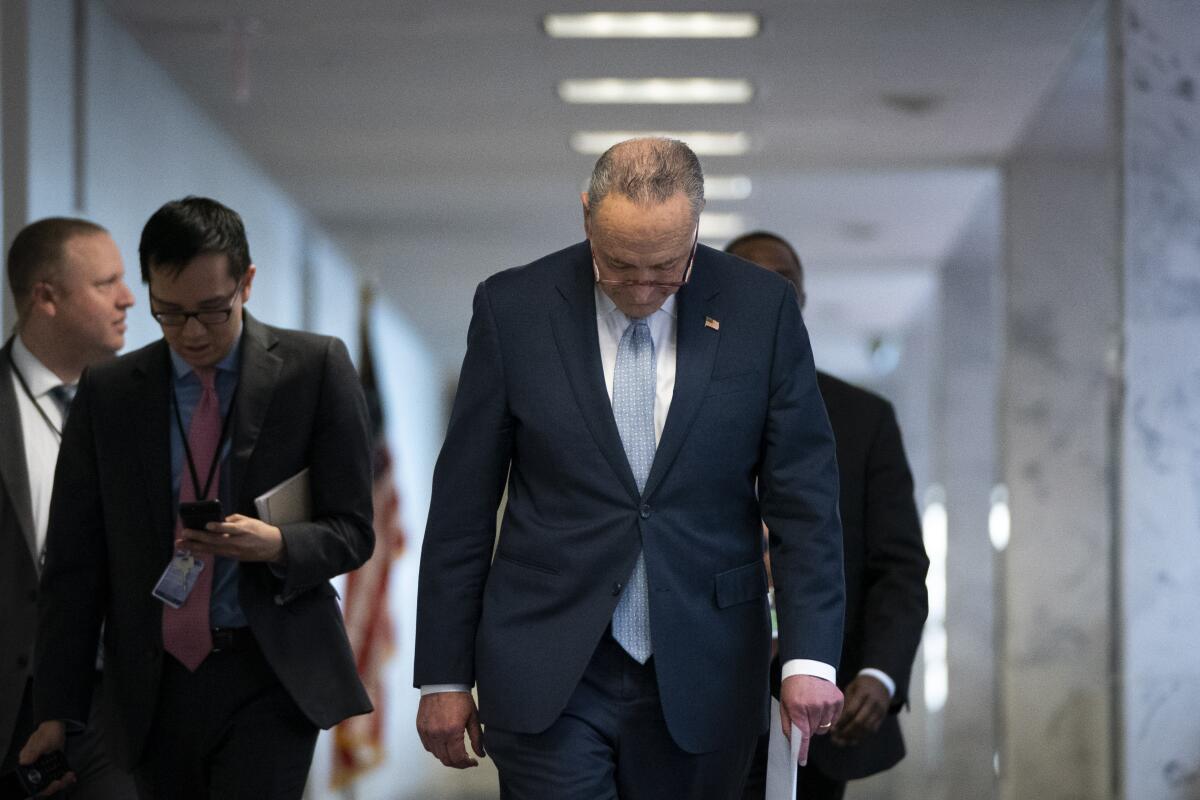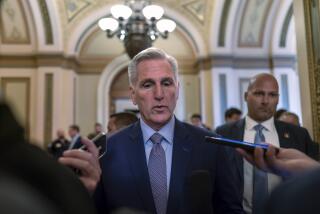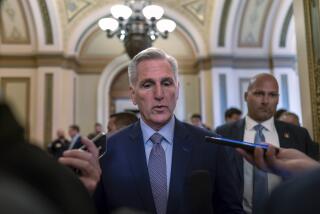Senate fails to provide more coronavirus relief money for small businesses

WASHINGTON — The government program designed to help small business weather the economic fallout of the COVID-19 pandemic ran out of money Thursday, and congressional leaders remained at a standoff over how to replenish the funds.
The Senate met for a brief session Thursday afternoon — the last opportunity it had to approve more money until next week. Since no action was taken, the program will remain depleted at least through the weekend.
Over 12 days, the Small Business Administration spent the entire $349 billion that Congress previously authorized to spend on forgivable loans intended to help small businesses maintain their payroll and health coverage for employees.
Republicans want to authorize an additional $250 billion for the Paycheck Protection Program. But Senate Minority Leader Charles E. Schumer (D-N.Y.) and House Speaker Nancy Pelosi (D-San Francisco) have balked at spending that money without ensuring that microbusinesses and disenfranchized companies are able to participate. They also want to add more funding for state and local governments and hospitals.
President Trump told lawmakers on a call Thursday morning that he’s open to adding additional program recipients to get a deal, Sen. Roy Blunt (R-Mo.) said.
“This is something that Democrats and Republicans at the leadership level should be able to figure out — what is it that we really need to do right now,” Blunt said. “We know that’s paycheck protection. Apparently the president’s open to discussing another topic or two.”
Aides to Pelosi and Schumer planned to continue negotiations with Treasury Secretary Steven T. Mnuchin, according to Democratic aides.
Senate Majority Leader Mitch McConnell (R-Ky.) was noncommittal as to whether Senate Republicans would agree to any deal cut between Mnuchin and Democrats.
“We’d take a look at it,” McConnell said. Republicans “want to plus up the small-business program. We think the need is obvious. And all the money for the other programs is not yet out the door. It doesn’t mean we won’t be dealing with them later. But we have an emergency; we ought to deal with it.”
The Paycheck Protection Program has strong bipartisan support. The political squabble over a second round of funding matched the partisanship in Congress before agreement on the sweeping stimulus package known as the CARES Act, which was bogged down for days until it finally passed without objection.
Democrats say very small businesses or companies without an existing banking relationship have had particular trouble accessing the loans because banks have given preference to their existing customers.
“We don’t want it to perpetuate the disparity of access to credit for some of our businesses,” Pelosi said Thursday.
Democrats also want to tack on additional funding for the healthcare system and for state and local governments.
“We really need to recognize the danger that some people are in when they try to help us,” Pelosi said, pointing to state and local government and healthcare workers. “We must have more resources placed.”
House Minority Leader Kevin McCarthy (R-Bakersfield) cited the 5.2 million people who filed for unemployment in the last week as a key reason why the money should be approved immediately.
“I cannot understand after watching another 5 million get unemployed how Speaker Pelosi continues to say no. It’s just unheard of. A program that is working that only provides the small businesses to stay afloat, to keep their people hired,” McCarthy said. “All it simply takes is the Democrats to say yes. I don’t know what more that it takes. You got 5 million reasons today.”
Congress has been largely out of session since passing the CARES package late last month. On Thursday, the nonpartisan Congressional Budget Office released the official price tag for that legislation: $1.8 trillion added to the deficit.
With social distancing and stay-at-home policies still in effect throughout the country, the House took a step toward allowing representatives to vote remotely, with a recommendation by House Rules Committee Chairman Jim McGovern (D-Mass.) that would allow members who cannot travel to Washington to have a member who is physically present vote on their behalf, and at their explicit direction.
Democratic leaders have expressed concerns about using technology to conduct remote voting, but a growing number of lawmakers have pushed Pelosi to allow some form of remote voting amid fears members could be exposed to the coronavirus while traveling to Washington or while at the Capitol.
“This system would enable members to vote remotely in a secure way, without using the kind of technology that is susceptible to hacking or interference by foreign bad actors. And because it doesn’t rely on some new technology being stood up and vigorously tested, it could give members a say on important legislation much more quickly,” McGovern said in a statement.
House rules can be changed by unanimous consent or voice vote, as long as no member objects.
That happened when the House approved the economic package in March by voice vote. House leaders were forced to recall hundreds of representatives to Washington when Rep. Thomas Massie (R-Ky.) objected to passing such a large, complex piece of legislation without taking a recorded vote.
Blunt told reporters Thursday that he’s considering virtual hearings and meetings, but not remote or proxy voting for the Senate.
“Neither the majority leader on the Senate side or the majority leader and the speaker on the House side have any interest in a legislative body that doesn’t convene. I think the Constitution clearly anticipates that members would be present,” he said.
Times staff writer Sarah D. Wire contributed to this report.
More to Read
Get the L.A. Times Politics newsletter
Deeply reported insights into legislation, politics and policy from Sacramento, Washington and beyond. In your inbox three times per week.
You may occasionally receive promotional content from the Los Angeles Times.











